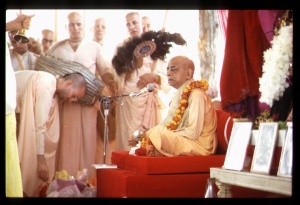CC Adi 5.86 (1975): Difference between revisions
(Vanibot #0027: CCMirror - Mirror CC's 1996 edition to form a basis for 1975) |
(Vanibot #0020: VersionCompareLinker - added a link to the Version Compare feature) |
||
| Line 2: | Line 2: | ||
<div style="float:left">'''[[Sri Caitanya-caritamrta (1975)|Śrī Caitanya-caritāmṛta (1975)]] - [[CC Adi (1975)|Ādi-līlā]] - [[CC Adi 5 (1975)|Chapter 5: The Glories Of Lord Nityānanda Balarāma]]'''</div> | <div style="float:left">'''[[Sri Caitanya-caritamrta (1975)|Śrī Caitanya-caritāmṛta (1975)]] - [[CC Adi (1975)|Ādi-līlā]] - [[CC Adi 5 (1975)|Chapter 5: The Glories Of Lord Nityānanda Balarāma]]'''</div> | ||
<div style="float:right">[[File:Go-previous.png|link=CC Adi 5.85 (1975)|Ādi-līlā 5.85]] '''[[CC Adi 5.85 (1975)|Ādi-līlā 5.85]] - [[CC Adi 5.87 (1975)|Ādi-līlā 5.87]]''' [[File:Go-next.png|link=CC Adi 5.87 (1975)|Ādi-līlā 5.87]]</div> | <div style="float:right">[[File:Go-previous.png|link=CC Adi 5.85 (1975)|Ādi-līlā 5.85]] '''[[CC Adi 5.85 (1975)|Ādi-līlā 5.85]] - [[CC Adi 5.87 (1975)|Ādi-līlā 5.87]]''' [[File:Go-next.png|link=CC Adi 5.87 (1975)|Ādi-līlā 5.87]]</div> | ||
{{CompareVersions|CC|Adi 5.86|CC 1975|CC 1996}} | |||
{{RandomImage}} | {{RandomImage}} | ||
==== TEXT 86 ==== | ==== TEXT 86 ==== | ||
| Line 18: | Line 17: | ||
<div class="synonyms"> | <div class="synonyms"> | ||
prakrti-sahite—with the material energy; tāṅra—His; ubhaya sambandha—both relationships; tathāpi—still; prakṛti-saha—with the material nature; nāhi—there is not; sparśa-gandha—even the slightest contact. | |||
</div> | </div> | ||
| Line 32: | Line 31: | ||
<div class="purport"> | <div class="purport"> | ||
In the Laghu-bhāgavatāmṛta, Śrīla Rūpa Gosvāmī, commenting upon the | In the Laghu-bhāgavatāmṛta, Śrīla Rūpa Gosvāmī, commenting upon the Lord's transcendental position beyond the material qualities, says that Viṣṇu, as the controller and superintendent of material nature, has a connection with the material qualities. That connection is called yoga. However, the person who directs a prison is not also a prisoner. Similarly, although the Supreme Personality of Godhead Viṣṇu directs or supervises the qualitative nature, He has no connection with the material modes of nature. The expansions of Lord Viṣṇu always retain their supremacy; they are never connected with the material qualities. One may argue that Mahā-Viṣṇu cannot have any connection with the material qualities, because if He were so connected, Śrīmad-Bhāgavatam would not state that material nature, ashamed of her thankless task of acting to induce the living entities to become averse to the Supreme Lord, remains behind the Lord in shyness. In answer to this argument, it may be said that the word guṇa means "regulation." Lord Viṣṇu, Lord Brahmā and Lord Śiva are situated within this universe as the directors of the three modes, and their connection with the modes is known as yoga. This does not indicate, however, that these personalities are bound by the qualities of nature. Lord Viṣṇu specifically is always the controller of the three qualities. There is no question of His coming under their control. | ||
Although the causal and element-supplying features exist in material nature by dint of the glance of the Supreme Personality of Godhead, the Lord is never affected by glancing over the material qualities. By the will of the Supreme Lord the different qualitative changes in the material world take place, but there is no possibility of material affection, change or contamination for Lord Viṣṇu. | Although the causal and element-supplying features exist in material nature by dint of the glance of the Supreme Personality of Godhead, the Lord is never affected by glancing over the material qualities. By the will of the Supreme Lord the different qualitative changes in the material world take place, but there is no possibility of material affection, change or contamination for Lord Viṣṇu. | ||
Latest revision as of 18:49, 26 January 2020

A.C. Bhaktivedanta Swami Prabhupada
TEXT 86
- prakṛti-sahite tāṅra ubhaya sambandha
- tathāpi prakṛti-saha nāhi sparśa-gandha
SYNONYMS
prakrti-sahite—with the material energy; tāṅra—His; ubhaya sambandha—both relationships; tathāpi—still; prakṛti-saha—with the material nature; nāhi—there is not; sparśa-gandha—even the slightest contact.
TRANSLATION
Although He is thus connected with the material energy in two ways, He does not have the slightest contact with it.
PURPORT
In the Laghu-bhāgavatāmṛta, Śrīla Rūpa Gosvāmī, commenting upon the Lord's transcendental position beyond the material qualities, says that Viṣṇu, as the controller and superintendent of material nature, has a connection with the material qualities. That connection is called yoga. However, the person who directs a prison is not also a prisoner. Similarly, although the Supreme Personality of Godhead Viṣṇu directs or supervises the qualitative nature, He has no connection with the material modes of nature. The expansions of Lord Viṣṇu always retain their supremacy; they are never connected with the material qualities. One may argue that Mahā-Viṣṇu cannot have any connection with the material qualities, because if He were so connected, Śrīmad-Bhāgavatam would not state that material nature, ashamed of her thankless task of acting to induce the living entities to become averse to the Supreme Lord, remains behind the Lord in shyness. In answer to this argument, it may be said that the word guṇa means "regulation." Lord Viṣṇu, Lord Brahmā and Lord Śiva are situated within this universe as the directors of the three modes, and their connection with the modes is known as yoga. This does not indicate, however, that these personalities are bound by the qualities of nature. Lord Viṣṇu specifically is always the controller of the three qualities. There is no question of His coming under their control.
Although the causal and element-supplying features exist in material nature by dint of the glance of the Supreme Personality of Godhead, the Lord is never affected by glancing over the material qualities. By the will of the Supreme Lord the different qualitative changes in the material world take place, but there is no possibility of material affection, change or contamination for Lord Viṣṇu.